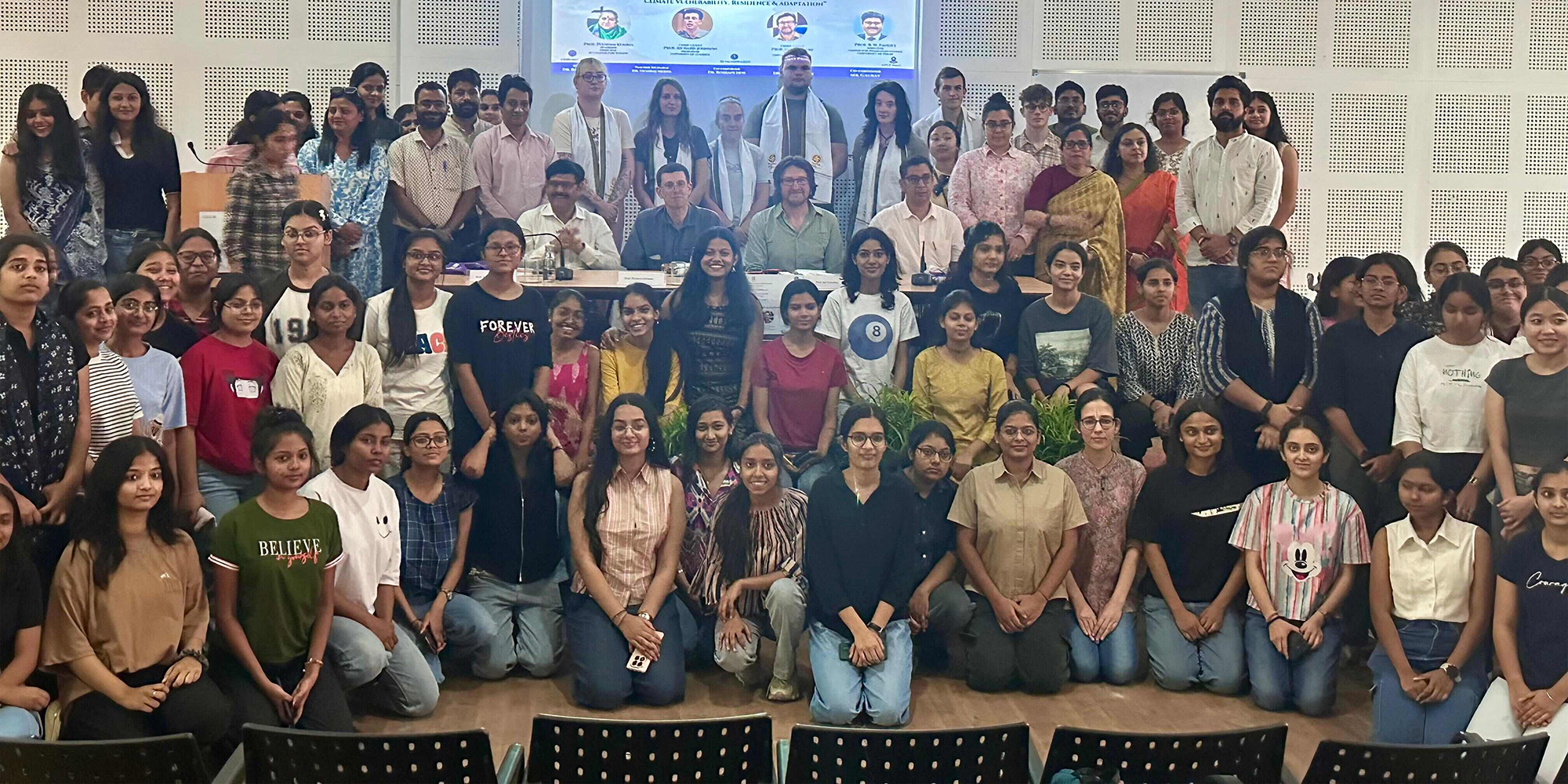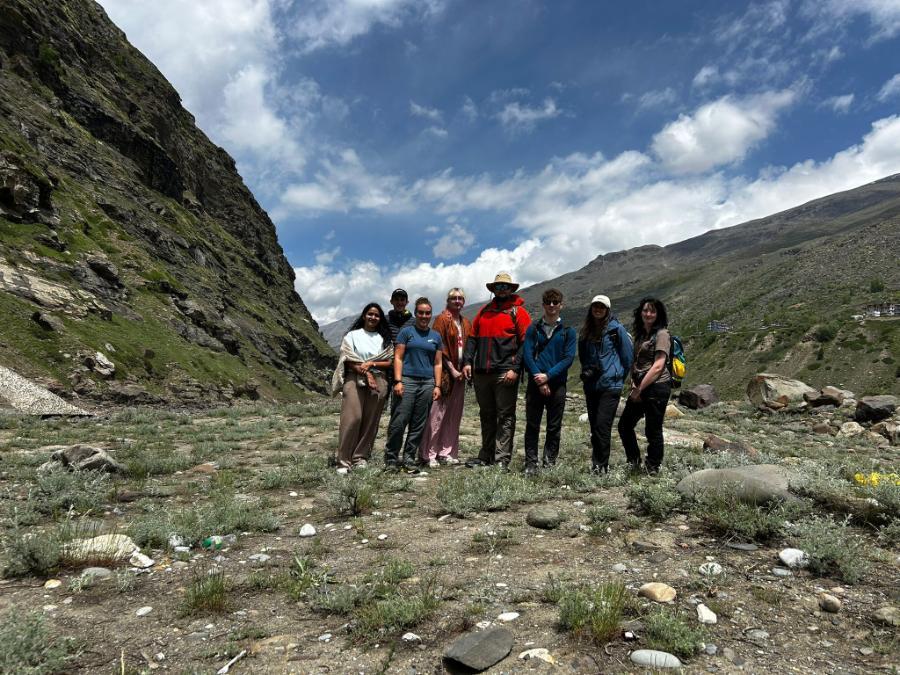
During May and June 2025, seven students from the University of Cumbria (Turing Scheme Funded) travelled to India for a bi-lateral research placement. With the support of University of Cumbria staff (Dr Rich Johnson & Prof. Ian Convery) Cumbria students collaborated with postgraduates and faculty at the University of Delhi (Centre for Himalayan Studies, Department of Geography, International Students’ House, and Indraprastha College for Women). Similarly so with the GB Pant National Institute of Himalayan Environment (GBP-NIHE) at the Himachal Regional Centre in Kullu (Himachal Pradesh) and Headquarters in Almora (Uttarakhand). Here UK and Indian students highlight the importance and benefits of this international collaboration, featuring their reflections from this cross-cultural learning venture. Their placement overview film can be viewed here.
-262x349.jpg) |
|---|
Travelling with six fellow students from the University of Cumbria to India for a research trip was an incredible experience. The placement was filled with the stunning scenery of the Himalayas, diverse cuisine and opportunities to make new cross-cultural friendships, and in a few instances unpredictable travel. If I had to summarise the trip in four takeaway points, these would be mine:
(1) The trip brilliantly encapsulated the phrase ‘People make the Place’. During the trip we worked, travelled and stayed with some amazing people. From working on a research presentation for an international conference with students from the University of Delhi, to spending hours reading and translating daily village logbooks with translators from GB Pant in Kullu, to travelling across mountain states with brilliant drivers and staying with hosts from Rustic Roots, it would be fair to say many friendships and memories were made throughout the placement.
(2) Having the rare opportunity to be part of an active research project- collecting data for the ongoing Kullu District flood research portfolio (‘HiFlo-DAT’) was a privilege. Whilst on the trip, I saw the importance of local knowledge in every stage of research, through gaining access to community records, discussions at village workshops and translating local people's views and opinions. A research synopsis film can be viewed here.
(3) Whilst visiting the Kullu District, it became apparent that it shares much in common with the English Lake District. Both regions attract large numbers of tourists, supporting economic growth. However, in some aspect's tourism has started to negatively impact the area, whether it be the development of tourist amenities in marginal locations, unmanaged waste disposal or the ignorance to local people’s wants and needs.
(4) Travel in the Himalaya can be an epic adventure! In our third week, we had a 10-hour journey from Chandigarh to Almora. Five hours into this journey, the Sat Nav suggested we had seven hours remaining, with delays due to tourist traffic on the mountain passes. Unfortunately, this number only grew, and we finally got to our destination after 17 hours of travel. I don't think I will ever complain about traffic in the UK again!
Hannah Wright, University of Cumbria
-720x540.jpg) |
-813x1080.jpg) |
|---|
In every aspect this trip was an incredible opportunity, giving rich cultural immersion, enabled by the expertise and hospitality of all those we interacted with. Being part of a wider research team, was a real highlight, developing my research awareness. It brought home to me the real-world importance and value of applying these skillsets. Following the placement, I am excited to continue working with the bi-lateral research team via my final-year dissertation. It was a privilege to get to experience such an incredible part of the world and share that adventure with a great team of people.
Ethan Baxter, University of Cumbria
-527x390.jpg) |
|---|
India was an incredible experience. It really broadened my skill set and gave me a strong idea of what I would like to do for my dissertation. As a zoology student, it taught me about the interdisciplinary nature of environment-society challenges. Working with students from India was amazing, everyone was so kind and eager to help on our shared project work; we worked incredibly well as a team. I absolutely loved birdwatching in India; I saw an incredible array of species across Himachal Pradesh, Uttarakhand and New Delhi.
Katie MacDonald, University of Cumbria
-517x390.jpg) |
-520x390.jpg) |
|---|
The India-UK collaboration project on the air quality in Delhi was a highly insightful and enriching experience. It involved not only data collection using monitoring instruments but also engaging conversations with UK students, learning about their research and university work. This interaction was exciting, and we quickly developed a strong bond with each other. Through team conference presentations, we improved our communication and teamwork abilities.
Anu, University of Delhi
-520x390.jpg) |
|---|
During the month of May- June 2025 we had the opportunity to host international students from the University of Cumbria in the serene mountains of the Kullu District, Himachal Pradesh.
There were seven students and two professors who visited India for the assessment of floods in the Kullu District. The UK team members were incredibly kind, calm and warm-hearted. We really admired the polite and respectful way our foreign teammates approached their tasks.
Translating Patwari daily record books and undertaking village workshops in Bajaura and Mohal, we together explored community flood knowledge, challenges and aspirations. All a step towards meaningful disaster risk reduction via resilience. It highlighted the power of collaboration and community in fostering lasting change. We truly loved that!
It was a rare and enriching opportunity, where we too discovered many new things about our own region. Together with our shared curiosity we explored local ecology, traditions and learnt a lot about the flood hazards that occurred, the destruction caused, and the support given by the government to the victims. It was inspiring to witness how academic boundaries dissolve in nature's classroom. We had so much fun exploring the places together, and we really enjoyed our work, with all the laughter and jokes, we never even realised how quickly time flew by. This seven-day journey was not just about connection, but more so respect and discovering how much we can learn from one another across cultures as a team; we built long-term connections and friendships that we deeply value. Even today, as new friends across continents we stay connected through social media.
Aparna, Isha, Pratiksha, and Priyanka (Translators in Kullu)
want to find out more about our research?
Our impactful research across health, environment, business and leadership, arts and education delivers real world benefits for local, national, and international communities, practitioners, and industries.

.jpg)


.jpg)